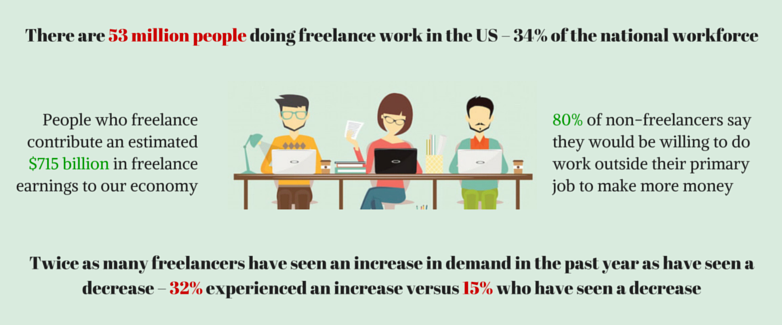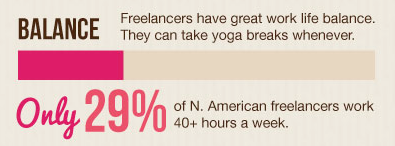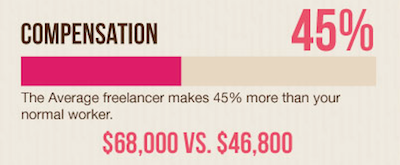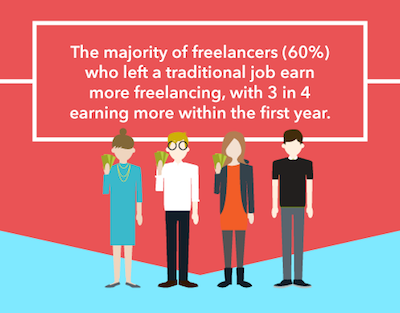Freedom. Flexibility. Financial Independence.
Sounds attractive, right?
Especially if you’re shackled to a 9-to-5 job.
Let’s take a close look at freelancing to see if it delivers on freedom, flexibility, and financial independence for writers.
But before we dive into each one of these promised advantages, let’s take a look at the current state of freelancing.
Is freelancing becoming more popular?

According to statistics from AdaptRM:
- 53 million people are doing freelance work in the U.S. – that’s 34% of the workforce.
- 1.4 million freelancers work across all sectors in the UK – a 14% growth over the past decade.
- And in Europe, the number of freelancers increased by 43% from just under 6.2 million to 8.9 million in 2013.
As you can see, freelancing is on the rise across Europe and the U.S. and is expected to continue rising over the next few years. Consequently, freelancing is more respected now than it was three years ago.
What are the most popular freelancing roles?
Perhaps, you think that you don’t have the skills to be a freelancer. But don’t worry, there are many different ways of being a freelancer.
Although some freelancers use their previous job skills, others start freelancing by pursuing their hobbies or trying something entirely new.
Here are the Top 15 Types of Freelancers [Source]

As you can see above the top 15 are predominantly online-based roles. However, that’s not to say that traditional careers like engineering and accounting don’t have freelancers too.
With this background in mind, let’s take a look at the benefits of being a freelancer.
Freedom
#1 No travel to work
Most freelance jobs allow you to work from home. That is a big plus.
For those commuting to the office every day, a 9-5 can turn into a 7-7. Those additional four hours can become frustrating and unproductive if you’re driving the car. If you use public transport then perhaps you can work (more) or relax with a book or some music. Either way, it makes for a longer day.
A freelancer has the freedom to use those extra four hours as they wish. Perhaps it’s a chance to pursue a new hobby. Brent took up cycling, and now he’s hooked.
#2 Work in your PJs
Or your birthday suit. Or whatever you fancy.
Just having the freedom to wear something you’re comfortable in is a bonus. No more formal suit, shirt, and tie.
#3 Location independence
Depending on your freelance job you might have the opportunity to work from different places, near and far.
The laptop lifestyle is very appealing if you want to travel to different locations around the world. Travel blogger and writer Ryan Biddulph has made a freelancing career by blogging from paradise.
Other freelancers prefer to spend some of their time working in a local coffee shop as it takes them away from usual distractions, including the internet.
Two-thirds of freelancers agree that freelancing provides the opportunity to work from anywhere, and more than one-third have been able to move thanks to the flexibility freelancing provides. Freelancing in America 2015 Survey
#4 Don’t have to deal with colleagues
Let’s face it, some of your colleagues are not the easiest to get on with. And that’s putting it mildly.
As a freelancer to you can choose with whom you work. And if they start messing you around then you can (politely) dump them. Plus when you start building your network you get to hang out with other freelancers of your choice.
#5 Don’t have to put up with ridiculous corporate decisions
A freelancer starting their own business assumes multiple roles. You’re the CEO, CFO, and COO running the whole show.
That might be daunting for some people. But the positive is that you don’t have to read those ridiculous corporate emails that were full of gobbledygook.
You make your own decisions, and you live by them.
Flexibility
#6 Work/life balance
When you work in a corporate job, and the HR department mentions work/life balance you can be sure that they’ll have their pound of flesh before balancing the scales.
Only 29% of North American freelancers work over 40 hours a week. [Source]

As a freelancer, you call the shots. You get to balance work and life as you wish.
#7 Take a break when you want
Need to pop out for some groceries. Or pick the kids up from school. Or use the gym while it’s quiet. No problem. As a freelancer, you can take a break when you want. There are no set rules.
#8 No fixed hours
If you want to work 60 hours one week and take the next week off, you can.
If you want to work 10 hours Monday but only 2 hours Tuesday, that’s cool.
#9 Choose the projects to work on
Choosing which projects you want to work on is a big plus. If you enjoy working on your projects, then you’re going to be more motivated. Working on them is not a chore.
#10 You can pivot at any time
As a freelancer you are independent. This allows you to change direction if a particular idea is not working as expected.
In the corporate world, this is not so easy. Often there are several meetings and approvals to be granted before a decision to switch is made. That process can be tedious, and costly.
Having the flexibility to pivot quickly can be a game-changer.
Financial Independence
#11 Earnings
As a freelancer, you are in control of your earnings. Most of the time this will be related to the number of projects you decide to take on and your agreed rates.
If your rates are deemed too expensive, and clients try to barter you down, then you can politely tell them no. Other people value your work and will pay your rates.
The average US freelancer makes 45% more than your typical worker. [Source]

The majority of freelancers (60%) who left a traditional job earn more freelancing, with 3 in 4 earning more within the first year. [Source]

#12 Several sources of income
You’ve heard the phrase, “Don’t put all your eggs in one basket.”
This is good advice for freelancers.
If you build a portfolio of clients, then you are not financially dependent on one source.
If one client suddenly pulls the plug, then you have a few others to keep you ticking over while you find a replacement.
#13 Reward yourself
Are you motivated by company bonus schemes? Perhaps you’ve not experienced the ‘moving the goalposts’ bonus scheme. The one where you work your butt off, meet the bonus criteria, only for your boss to inform you there is no bonus because the company made a loss.
It’s quite deflating.
Freelancers get to reward themselves appropriately without hidden criteria.
#14 More motivated
When you control your finances, both income, and expenditure, then you become more motivated. You know how much you need to earn each month to pay your business expenses, as well as put food on the table.
#15 Job security
This might seem a strange one. Surely, having a traditional salaried job is more secure than being a freelancer?
But in the current economic climate, the so-called job for life has all but disappeared.
Redundancies and layoffs are more common.
And zero hours contracts are the norm.
49% of freelancers felt little or no impact from the recession. [Source]

Therefore, freelancing can be more secure. You control your destiny.
Conclusion
As Brennan Dunn says:
“Freelancing, or the ‘gig economy,’ as it’s known, is on the rise.”
It won’t be for everyone. Some people will prefer to stick with their traditional 9-5 job.
But if you want to take full control over your future with the Freedom, Flexibility and Financial Independence that freelancing offers, then now is a good time to start.
















